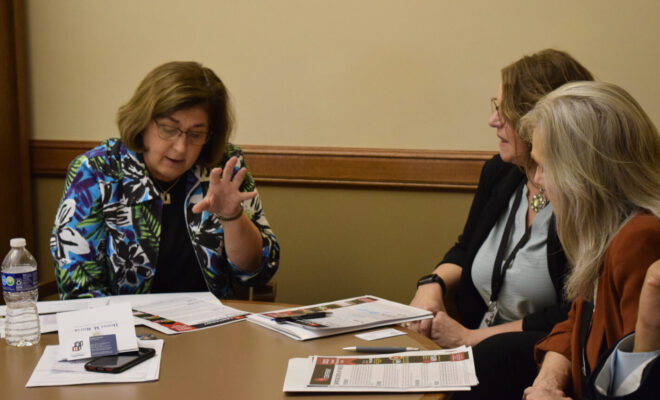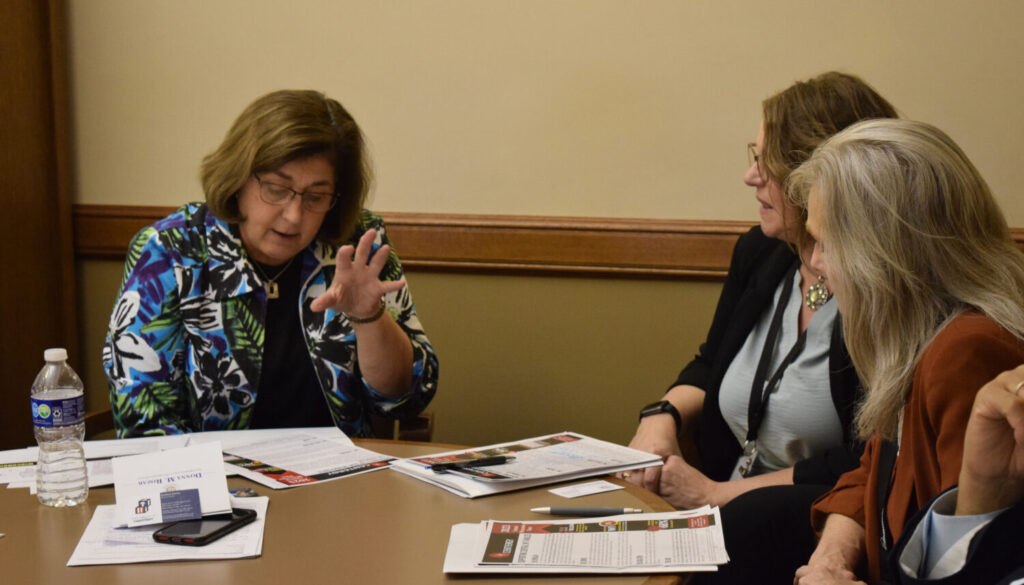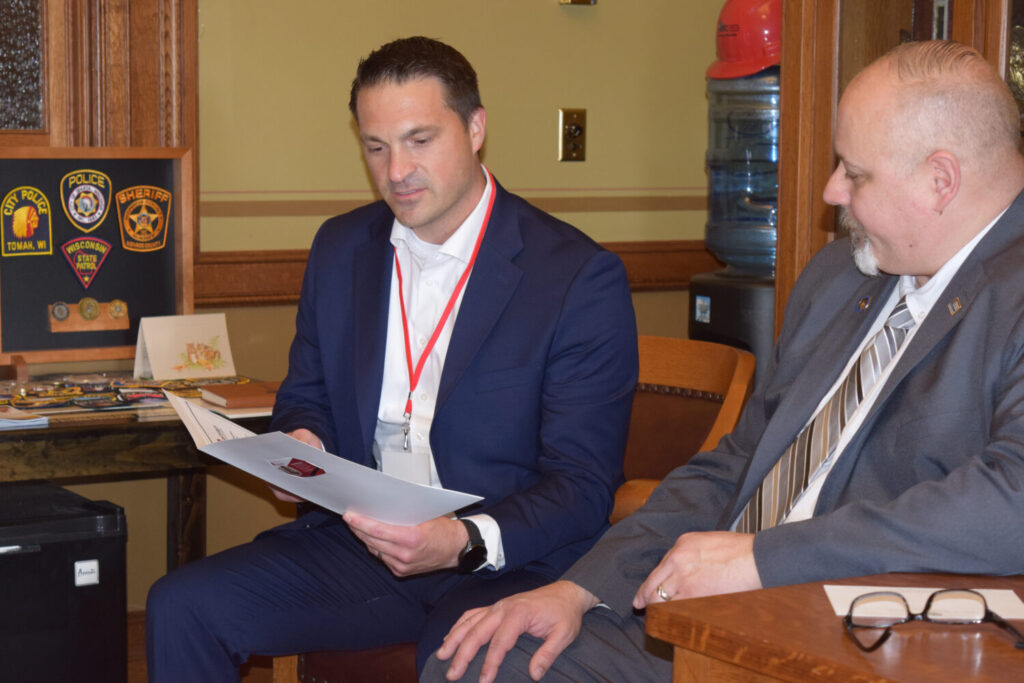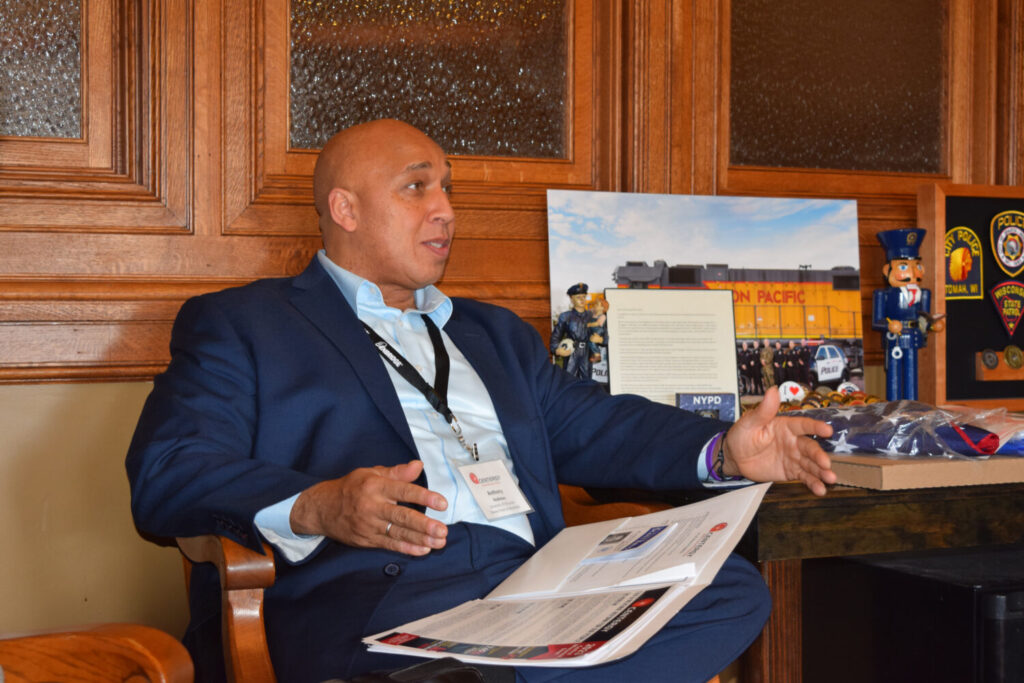Converging on the Capitol

BY MIKE WARREN
MADISON – Business, industry and education leaders from central Wisconsin spent a recent afternoon taking their top issues directly to those in the best position to do something about them – state lawmakers.

Centergy hosted Central Wisconsin Days April 4-5 in Madison, featuring 30-minute sessions with area lawmakers or their representatives at the state capitol.
“The reason why we host this event is for the opportunity for our business community to really have a voice down here at the capitol,” said Centergy President/CEO Angel Whitehead. “We’re one of the only groups that do it, and if we’re not telling our legislators what’s happening in our communities and how our businesses are being impacted or hurting, who’s going to tell them? We need to bring those voices down here,” she added.
Centergy has hosted the annual event for nearly two decades. This year, nearly 100 residents met with lawmakers to inform them about current high-priority, public policy issues that impact economic development in central Wisconsin, namely housing, childcare, and tax reform.

An overwhelming need for childcare was identified by the groups. A shortage of childcare has left many parents/guardians with no other option than to remain home to care for their children, and not return to the workforce post-pandemic.
“You really have to plan your childcare before you even plan to have a baby because it’s two years before you can get any childcare for a baby nowadays,” said Karen Olson, Development Director for the Marshfield Area Chamber of Commerce & Industry, as she and other Marshfield business and education representatives met with Sen. Jesse James (R-23). “The people we talk with, they have enough teachers probably right now, but they don’t stay in the (work) force for long,” Olson added. “It needs to be looked at as a career. They are teachers of our young and we need to look at that as a sustainable career with benefits and good pay teaching our young, so that they – maybe on the other spectrum of life – stay out of the judicial system, which costs us way more.”
Olson and the other Centergy advocates asked for additional grants for the Child Care Counts: Stabilization Payment Program, which allows eligible providers to receive ongoing monthly payments, providing the financial stability they need to stay open, to recruit and retain qualified staff, and to continue providing high-quality care for children.
“It’s gonna be a challenge. I’m not gonna lie,” Sen. James told the group. “There are people that feel that this is something that should’ve never been government-subsidized, and it’s created a sustainability issue, and now we have to answer for it,” James added. “We have not had the discussion on the Senate side yet regarding Child Care Counts.”
The Stabilization Payment Program Round 2 was a nine-month payment program that ran August 2022 through April 2023. It will be followed by an additional nine-month payment program, with the renewal application opening in May.
Housing was also identified by the group as a major issue. “An increase in single and multi-family housing stock in the Centergy region is directly related to our ability to recruit and retain people in the prime working ages of 25-64,” according to a Centergy press release.
Olson told Sen. James about the recent hardships business and education recruits to the city had in finding suitable housing before starting their new jobs, in particular Mark Bowie, Director of the new C2 Makerspace at UW-Stevens Point at Marshfield.
“We hired (Bowie) from California, and it took him eight to nine months to find housing. We waited that long for him to get here. He just couldn’t find anything, even from the rental side of things, but certainly a house, which is what he really wanted,” Olson said. “So, that put us behind in getting that organization going. We had funding and everybody was ready, and they kept saying, ‘Why isn’t it happening?’ It was because our director from California – which was a good transplant to bring into Wisconsin – couldn’t find housing,” she added. “The city sees it as an issue and they’re doing as much as they can. They started a subdivision because we’re years behind. This should’ve been looked at a long time ago, and I think other areas are finding that as well.”
Olson’s group of Marshfield business, industry and education representatives encouraged legislative efforts to increase the annual amount of low-income tax credits certified by WHEDA, with 35 percent set aside for rural communities with populations under 10,000.
“There’s legislation being worked on right now that is strictly focused on the housing issue, so I think those will be rolling out here soon,” Sen. James told the advocacy group.

The third topic the Centergy groups advocated for was tax and revenue reforms.
The Centergy groups were asking for legislators to consider initiatives that would lower the top marginal personal income tax rates, eliminate the personal property tax for businesses and maintain the Manufacturing and Agriculture Credit at its current level. “I heard you talk about personal property tax. I think that’s going to get passed this session,” James told the group. “I’ve not heard one bad thing about this. The income tax issue – I don’t know where we’re at on the Senate side with taxes. I know the Assembly has talked about compressing into two the four brackets that we have currently,” Sen. James added. “That’s been discussed. I don’t know where they’re at.”
The Centergy representatives also encouraged legislative support for reforming the state’s shared revenue formula for local governments, which is driving more and more school districts and municipalities to referendums, for things like maintaining curriculum, programs and proper staffing levels. Coincidentally, the meetings with lawmakers came the day after voters rejected referendums in both the city and school district of Marshfield.
“As soon as I knew that those referendums lost, I said the reason that these lost is because people don’t want to see their taxes at the local level go up,” said Rep. Donna Rozar. “So, we’ve got to step up to the plate at the state to go back to supporting a lot of these programs, which we did in 1911, when we initiated the income tax,” said Rep. Rozar. “Ninety percent of that money went back to local municipalities when the income tax was initiated in 1911. We are down to about eight percent,” she added.
Aside from Sen. James and Rep. Rozar, Centergy advocacy groups were also able to meet with Representatives Nancy VanderMeer and Katrina Shankland, along with Sen. Patrick Testin.
“I’ll be following up with the legislators we met with, see what kind of bills are out there, what’s happening on the floor at this time and what are our next steps so we can keep advocating for these issues and making an impact,” Whitehead said at the end of the day.
Centergy is a regional economic development organization representing a five-county region in central Wisconsin, and is based in Wausau. The organization is focused on promoting central Wisconsin to help attract, retain and develop talent and businesses in the counties of Wood, Adams, Portage, Lincoln and Marathon.


